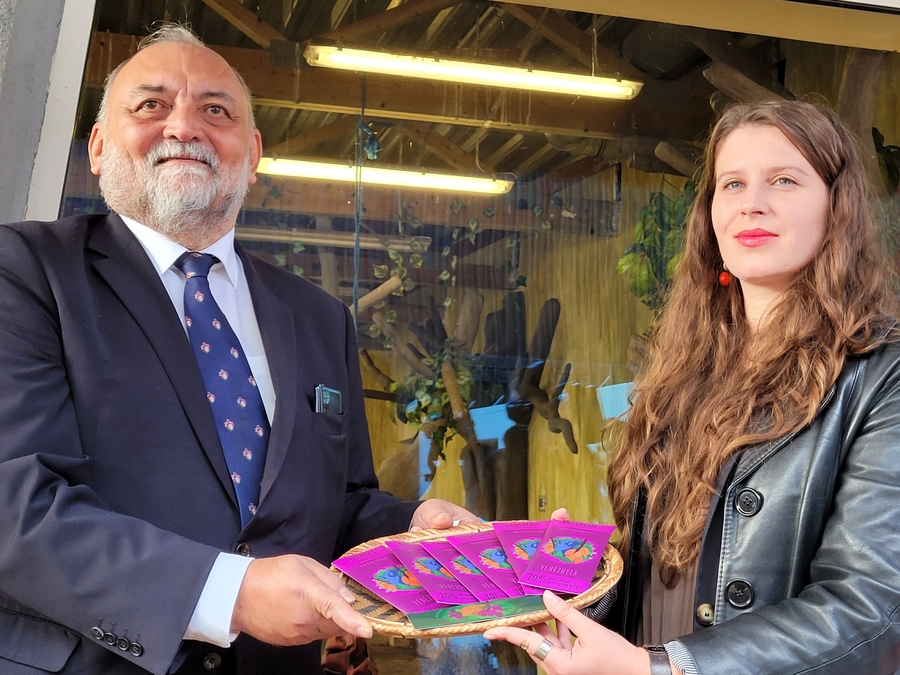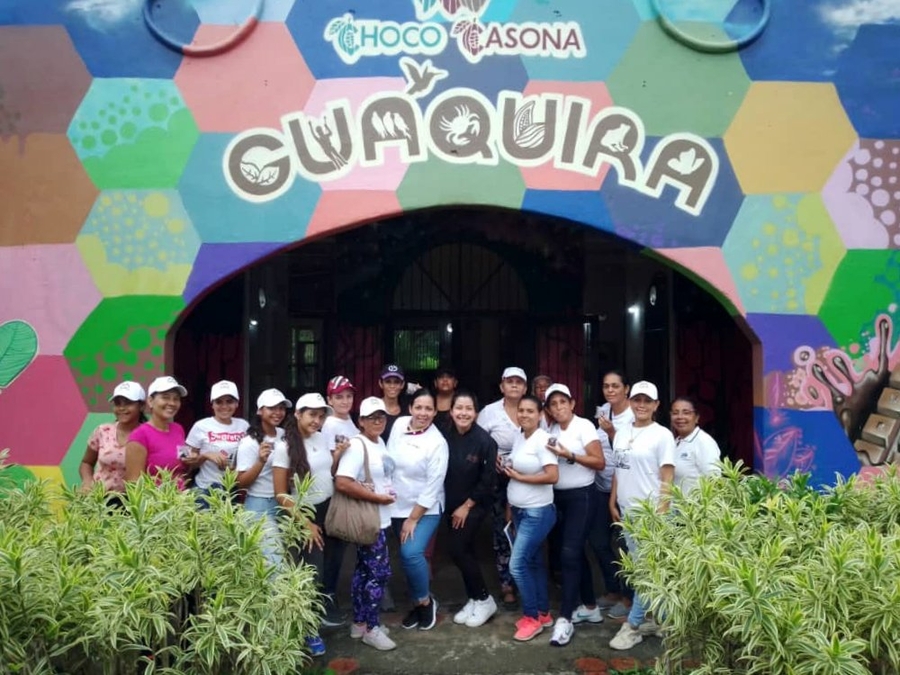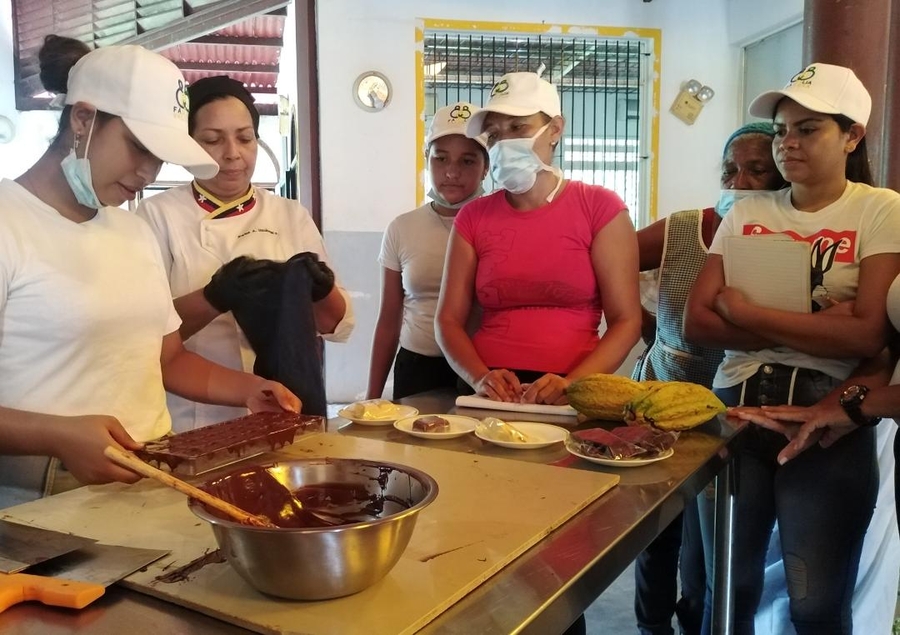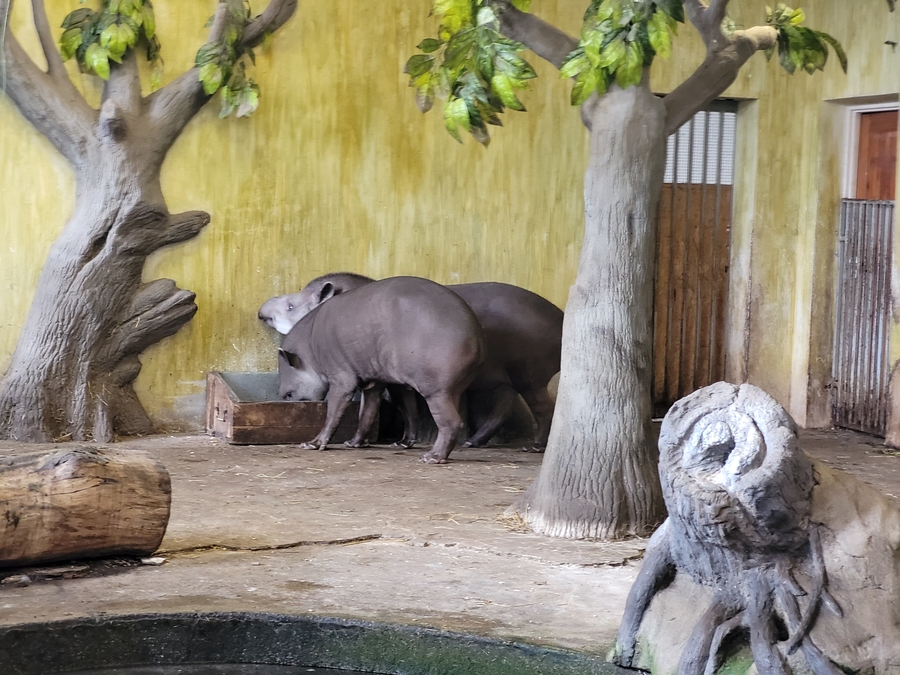 Dr Izabela Stachowicz from the Faculty of Biology and Environmental Protection, University of Lodz and the Venezuelan ambassador Luis Gomez Urdaneta in the Orientarium Zoo in Lodz promote the campaign to help people and tapirs.
Dr Izabela Stachowicz from the Faculty of Biology and Environmental Protection, University of Lodz and the Venezuelan ambassador Luis Gomez Urdaneta in the Orientarium Zoo in Lodz promote the campaign to help people and tapirs.
Cocoa and chocolate
Although the closest plantation of cocoa is as much as 6,000 kilometres from Poland, this does not prevent us from being the fourth exporter of this product in the world (behind Germany, Belgium and Italy).
The value of its sales abroad is almost USD 2.1 billion, which is 7.3 percent participation in global exports [Source: 2021 Euromonitor report]. Once a luxury product, today we bathe in it during our SPA breaks.
Cocoa used for the production of chocolate is imported primarily from Africa (Côte d'Ivoire, Ghana, Nigeria), Indonesia, and also from South America (Brazil and Ecuador).
 La Guaquira plantation, which Dr Stachowicz from the Faculty of Biology and Environmental Protection collaborates with
La Guaquira plantation, which Dr Stachowicz from the Faculty of Biology and Environmental Protection collaborates with
Fair Trade certification
– As consumers, we more and more often wonder where the meat, milk and eggs we buy come from. While shopping, we try to pay attention to whether they are produced in the right way. It is the same case with chocolate, coffee or tea – says Dr Izabela Stachowicz. – While doing shopping, it is worth paying attention to whether the products have certificates proving that they are produced in a sustainable manner and respecting the rights of workers employed on plantations.
We often hear about sustainable agriculture – domestic or exotic – but what does that really mean? Such production is a complex and difficult task, where the issues of production, people involved in it and environmental protection are equally important.
– In order to protect ecosystems or species, empowering local communities is of key importance. It is the people living in the wild that should guide and manage this process. For international conventions and treaties to be effective, local communities must have the means to live in dignity and support their families. Otherwise, in order to survive, they must exploit even the most valuable natural areas. What to say to a man who has to go to the forest, cut out of it and take everything that can be sold to feed and heal their beloved ones? For the hungry, it does not matter if a given species is protected or not and how many publications have been written about it – adds Dr Stachowicz.
“Fair trade” certificates confirm that employees are properly remunerated, have appropriate working conditions and social packages.
– There are local residents working on the plantation who are very involved in cocoa production. For many of them it is their whole life – says Dr Stachowicz. – This is an important trend, because thanks to the certificates, it is the consumer who decides whether they want to pay for the product, knowing that people are not exploited in the production of our favourite sweets.

Production of chocolate workshops on the La Guaquira plantation
– The growth of cocoa in the shade of tall trees is another element of sustainable production. It happens so only on some plantations but is of great importance both for the quality of cocoa and for maintaining biodiversity of the ecosystem on the plantation and in its vicinity – says Dr Stachowicz. – Plantations organised in such a way also provide shelter to many species of animals. During many years of my stay in Venezuela, I was able to observe how ocelots, armadillos, agouti and various species of monkeys as well as a great variety of birds feel perfectly on the La Guaquira plantation, which I cooperate with. I could also see what it means for the plants and animals. The plantation does not use any artificial fertilizers or any other synthetic agents. This affects the continuity of the ecosystem, but also less production and that is a conscious decision of those managing the plantation.
Tapir – the national treasure?
– The largest mammal in both Americas – the American tapir (Tapirus terrestris), in Spanish called – danta, is considered the "architect of the ecosystem". It plays a key role as a seed spreader, even over long distances. The animal strictly depends on water resources and can be observed near rivers, where, as for an animal of 200 kg weight (!), it swims and dives efficiently. It leaves seeds in the droppings, which move along the river to reach a new place and start germinating –says Dr Stachowicz. – Unfortunately, due to the economic crisis the inhabitants of Venezuela more and more often hunt tapirs, which is a big problem in this part of the world. I believe it is not enough to prohibit hunting. It is necessary to teach the basics – that this animal is one of the national treasures. The use of the image of a tapir in creating handicrafts for tourists can help in building this awareness. This is one way to reach the local community with the information that tapir hunting is bad. It cannot be done without giving the hungry people anything in return.
 Tapirs from the Orientarium Zoo in Lodz has become a symbol of Dr Stachowicz's aid campaign
Tapirs from the Orientarium Zoo in Lodz has become a symbol of Dr Stachowicz's aid campaign
We can help
In Venezuela, 70% of women are single parents with one or more children. This is a huge social problem that affects the very low economic status of Venezuelan women.
– During my research in Venezuela, I came across many women who lived on the verge of poverty, not because they did not want to work, but because they had small children and could not afford to travel to distant cities where they could find a job. – says Dr Stachowicz. – Some of them found employment on the cocoa plantation. However, there are about one hundred women in an extremely difficult situation in the immediate vicinity of the plantation and not all of them can be employed there.
Single mothers living near the Guaquira Ecological Reserve in Yaracuy state try to cope in many ways. Since they have access to chocolate from the plantations, they make their own pralines, which they can later sell at the local market. They are also involved in handicrafts. They create decorative elements made of reeds that resemble animals.
– My idea to help these women consists in buying molds for making pralines for them and give them the necessary workshop so that they can make tapirs for tourists visiting the Guaquira Ecological Reserve – explains Dr Stachowicz. – We are launching a fundraising for this purpose. Thanks to participation in the campaign, not only can you help Venezuelan women, but also have an impact on saving the tapir population.
Link to the fundraising: https://pomagam.pl/czekolada_misja
Source: 3PR, Faculty of Biology and Environmental Protection
Edit: Promotion Centre, University of Lodz
